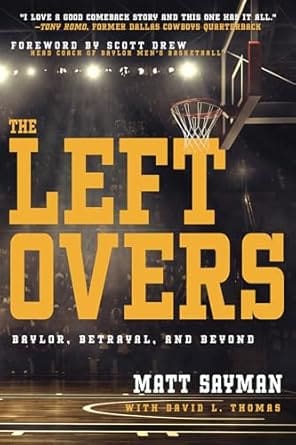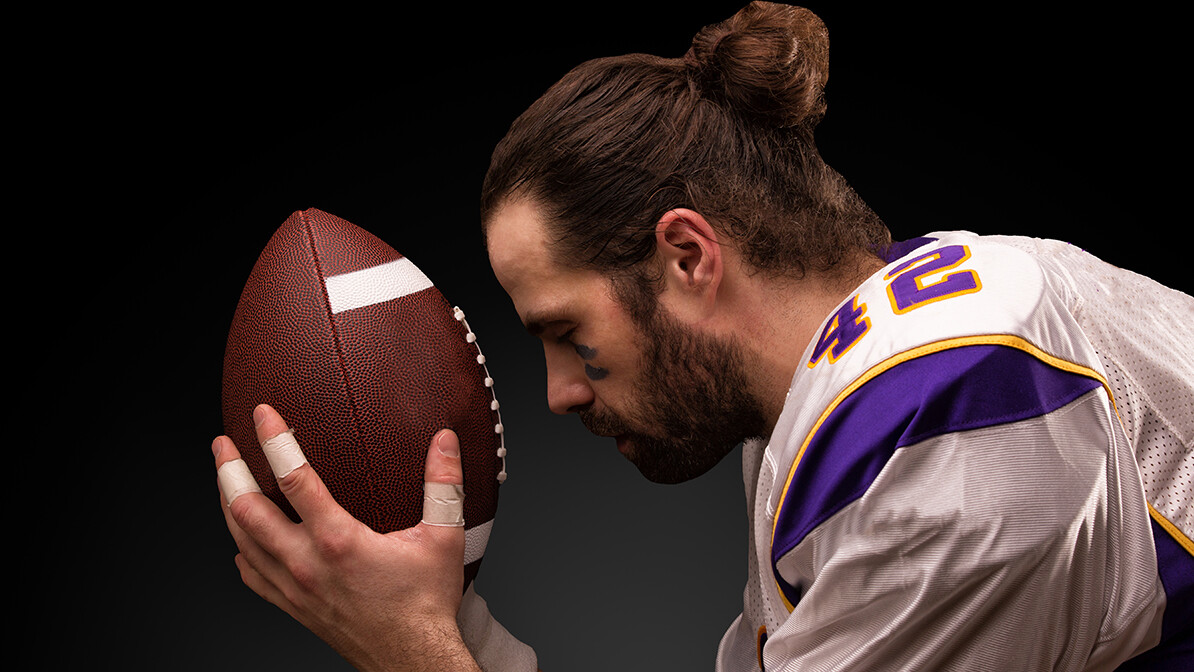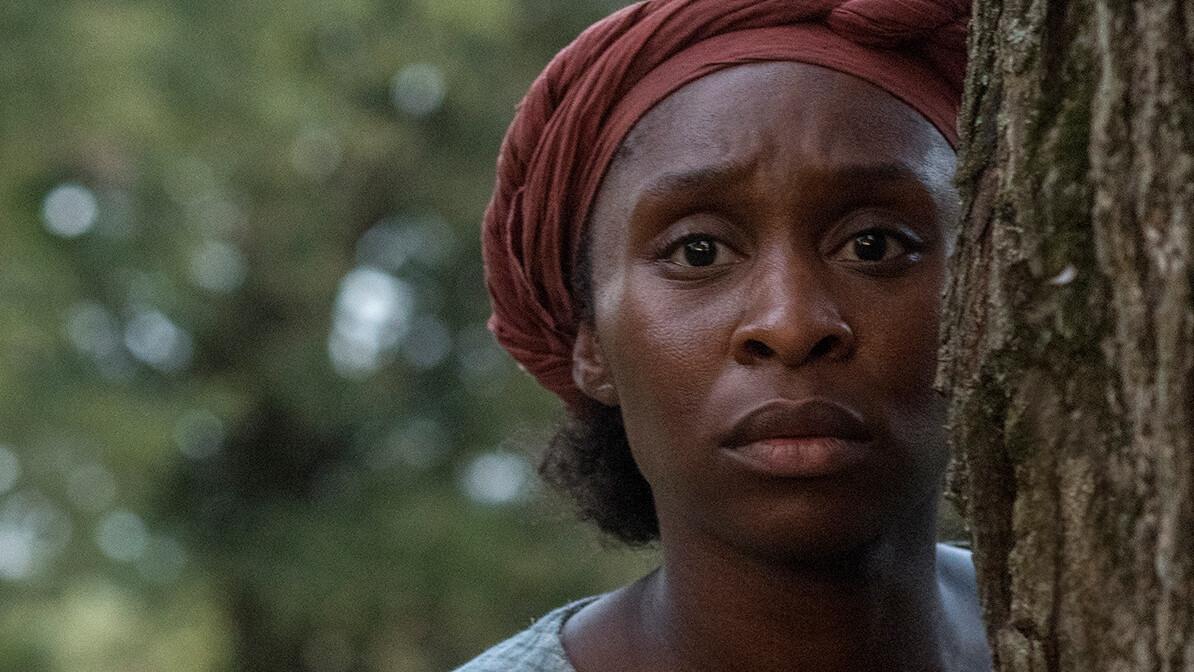- Home
- Entertainment
- A Story of Redemption

A Story of Redemption
 Excerpt taken from The Leftovers: Baylor, Betrayal, and Beyond by Matt Sayman
Excerpt taken from The Leftovers: Baylor, Betrayal, and Beyond by Matt Sayman
Chapter 21
A Story of Redemption
Our team wasn’t completely shut out of the Big 12 tournament. I received an invitation to appear as a guest during the television halftime show of one of the games. So, a week later, I was inside the American Airlines Center again. But this time, I could only watch. At least I didn’t have to pay for a ticket!
Part of me had wanted to decline, even though I was honored by the invitation. I was only one of the players who had played through the tragedy and scandal. All of us deserved to be at the tournament—in uniform, representing our school and playing. I decided to accept the interview to speak on my teammates’ behalf. Plus, it would be my pleasure to tell the TV audience about my love for Baylor basketball and our school.
I loved being part of the tournament atmosphere. Oklahoma State was playing as I walked the length of the court, with John Lucas zipping around and wowing the crowd. Pat Knight grabbed my arm as I walked past. He was an assistant coach for his father at Texas Tech, and he made a few pleasant remarks about me and our team. I received numerous compliments about our team while at the tournament.
During the halftime show, the broadcasters’ first questions were the ones I had answered what seemed like thousands of times throughout the season. I thanked Coach Drew and his assistants. I explained that he had brought us hope, and without the staff’s great work, none of our accomplishments would have been possible. Their question that stung the most was, “Do you look out and see the success that Lucas and Roberts are having and wonder, What if nothing had happened?” I had to hold back my distaste and give the answer I knew I should: I was proud of those guys and their success, and I wished them the best.
My retirement from basketball lasted two months. I was in the SLC one day and got roped into a pickup game. I quickly realized how much I missed playing. Through our marathon season, I had forgotten how much I loved basketball. The kid who spent thousands of hours practicing and dreaming was still alive inside me. My statistics were average, not great. I was a jack-of-all-trades and master of none, so I would be a hard sell to pro scouts. Coach Driscoll knew a scout in Iceland. He sent tape of me playing, and I received an offer to play on a team in the small town of Njardvik.
I had no idea they played basketball in Iceland, but I looked forward to a new start far away from the past. At the first practice, an Icelandic teammate asked where I played college ball. I told him I had graduated from Baylor. He looked perplexed, then asked in broken English, “Don’t the basketball guys shoot guys there?” Even on that sparsely populated island nation in the North Atlantic, it followed me.
Our team won the Icelandic Championship that season, and at one point, I was rated the best point guard in the country. Unfortunately, drinking and partying were second nature in Iceland, and it was too easy for me to keep up my bad off-court habits. Basketball was not my highest priority, and my game suffered. As a result, that was my first and last professional season.
I returned from Iceland lost. I couldn’t keep a job—I had nine over the span of three years.
Coach Thomas, my high school coach, helped me land work at a sports complex in the Dallas-Fort Worth area. My job included coaching a select team, and Coach T hoped coaching would reignite my passion for basketball. I was married, and when my wife became pregnant with our son Cade, I knew I needed to find a job with benefits. Coach T again tapped into his network for me, and in 2007, I took a full-time job as a reading teacher at Naaman Forest High School in Garland, where I could also serve as a volunteer assistant coach for head coach Jeff Clarkson. Cade made me a father while I was teaching and coaching there.
After one year at Naaman Forest, I accepted a job as an assistant coach for Wes Watson at McKinney High.
I was twenty-five, and Coach Watson spotted potential in me as a coach. He began grooming me to become a head coach, including turning over his team’s offense to me. He also was a patient mentor for me on a personal level, which I sorely needed.
I could control a basketball offense, but I still couldn’t control my life.
The damage was regrettable: a difficult divorce, a DWI, and too many broken relationships.
I had a hole in my life that I kept trying to fill with alcohol, women, working out, coaching, and anything else I thought might take my mind off my problems, even if only temporarily. My radio blared angry music to drown out my conscience. Anytime I allowed myself to think clearly, I experienced the same anxiety that caused me to dash out of that Fellowship of Christian Athletes meeting in a cold sweat years earlier.
I was still running in the wrong direction.
On any given night, with drink in hand, I would declare, “This is the last night! Tomorrow I start over!” Then after a few days of somewhat clean living, something triggered my anger and guilt, and I had to numb them.
Some nights I said, “If there is a God out there, please help me change!” But then I would choose to go right back to the same activities that were keeping me depressed. I rarely went to church, and when I did, my guilt prevented me from paying attention to the sermons.
Regret and shame accompanied me everywhere I went. I knew I was missing something, and I still chose the same solution—numb my pain. No matter what I tried, I could not find peace.
When people who knew me well started seeing through my cracks, I cut them out of my life. People like Steve Yoder, who had walked alongside me through seemingly everything. I could not call him because I didn’t want him to know I was struggling.
I was living a lie.
One Sunday morning in November 2011, I decided to go to church. I liked the energy of the church’s services and the pastor’s messages when I did go, but I had no interest in connecting with any of the people. As usual, I took a seat in the back, hoping to sit unnoticed. The church had visitor’s cards with spaces for a guest’s name, contact information, and prayer requests or comments. I had not filled one out on any of my previous visits, but for some reason, I took a card.
In the space for comments, I wrote two things:
“I’m angry.”
“I have questions.”
I didn’t expect a response. A few days later, I received an email from the church thanking me for filling out the card and offering an opportunity to meet with a pastor. By this point, I was open to anything that might help, but I believed the pastor was likely wasting his time.
After a few rounds of phone tag and because of my schedule as a basketball coach and the holidays, we set up a meeting in January.
On January 6, 2012—four days before my meeting with the pastor—I celebrated my thirtieth birthday alone with a six-pack in my apartment. I was miserable, asking myself, Is this how my life is supposed to be? Is this all there is for me in life?
When I walked into the church office, a woman greeted me and introduced herself as Jana. She had emailed me and helped to set up the appointment. I had pictured the email coming from the stereotypical image of an elderly church secretary. But Jana was a women’s pastor at the church, about my age, and very attractive.
While we waited for the pastor, we sat and talked, and she asked me questions about my life. I was blown away by her kindness and her interest in hearing my story. She was much kinder to me than I was to myself back then.
I went into the meeting with the pastor with one goal in mind: I wanted to vent and explain why I was in the shape I was in. I poured out everything about Baylor, how I had faith growing up, and how I had been such a good kid. I told him I never imagined in high school that I could be sitting here as a thirty-year-old surrounded by hopelessness. The summer before my senior year at Baylor had put me on this roller-coaster ride, and I didn’t know how to get off. I described how Pistol Pete, one of my heroes, had accepted Christ after injuries ended his NBA career and years of destructive behavior that followed. He was lying in bed when he heard a voice tell him that he was missing Jesus. Pistol Pete’s life changed from that moment, and he lived the rest of his life doing amazing things for God.
I told the pastor, “I haven’t heard anything.”
“Don’t be waiting for that,” he told me. “It doesn’t normally work that way.”
My heart sank. I hadn’t been able to straighten out on my own, and now I couldn’t even hope for a Pistol Pete-like experience? Then where could I find the help I needed?
The pastor asked if I was saved, and I not so confidently answered that I had been saved since I was young.
His response froze me.
“Matt, you have to trust your salvation. Lean on Jesus to do the work in you. Stop those behaviors that are keeping you from reaching your potential.”
I processed his statement in basketball terms: when I wanted to improve a part of my game, I had to spend time focusing on that area. Could the same idea work for my relationship with God?
The pastor explained that I could not earn my salvation; salvation was possible only through accepting Jesus as Lord and Savior. He also was direct in telling me that my life was out of control because of the decisions I had made at twenty-one. I had been avoiding accountability. My decisions caused my problems, not the circumstances at Baylor.
That one conversation changed my life.
The key word I took from our conversation was “surrender.” I had been crying out for guidance without opening myself up to receive any. I had tried countless times to stop drinking, only to surround myself with alcohol. I demanded that God speak to me, but I was unwilling to read His Word or be in His house.
Finally, after nine years of chaos from living my way, I gave up.
I surrendered.
Immediately, peace overwhelmed me. Paul describes it as a peace that “transcends all understanding” (Philippians 4:7).
Before my senior year at Baylor, I believed faith was the foundation of my life. I had grown up in a church and could probably score well on a Bible test. I was vocal about my faith; I was living and acting as a Christian should. I was known as a basketball player and a Christian. But I didn’t realize that the essence of Christianity is not calling yourself a Christian and trying to be good. It’s a relationship with Jesus Christ and making Him Lord of your life. The tragedy and the scandal at Baylor revealed I had built my life around basketball. That was my idol. And when the source of my identity got ripped away, I had nothing.
From the day I met with the pastor, I never had the desire to party or drink alcohol again. With God’s help, my last drink occurred on my thirtieth birthday. I started attending church regularly and serving as a volunteer. I studied the Bible, which drew me closer to God. I changed the types of TV shows I watched and the music I listened to. I was amazed at how listening to worship music in the morning affected the rest of my day.
Before my senior year, I had behaved how I knew I should and said the things I knew I needed to say. I was trying to live a Christian life out of my knowledge. But now, I lived out of an authentic love for God and appreciation for His faithfulness to me. I was living from the outflow of a changed heart.
Looking back, I can see God’s plan bringing me to a place where I would meet someone who would change the trajectory of my life. But that person wasn’t the pastor!
Before I left the church that day, Jana gave me her phone number and offered the church’s help with any of my needs or questions. Her offer wasn’t a hey-I’m-interested-in-you type of offer. And I was trying to find myself, not a wife. But Jana genuinely cared for me and wanted to make sure I understood the church’s desire to help me spiritually.
I texted her later that day to thank her for helping to arrange my meeting with the pastor.
Jana and I began to exchange texts, and then we started calling each other. Over a three-day period, we spent thirteen hours on the phone! She listened to my story, and I listened to her. She also was divorced and had a son, Landon. A few weeks later, we met up for a friend date … and the rest of that story is easy to figure out.
We married that December.
Before meeting Jana, I had convinced myself that because of my past, I could never find a godly woman who would want to love me. I believed my sins were worse than others’ because I had grown up in church and knew all along I was living the wrong way. I knew the truth, and I had chosen to reject God.
I could not have been more wrong.
…
Order your copy of The Leftovers: Baylor, Betrayal, and Beyond by Matt Sayman
Trending Now
Sign up today for your Inspiration Today Daily Newsletter
Supercharge your faith and ignite your spirit. Find hope in God’s word. Receive your Inspiration Today newsletter now!
Matt Sayman
Matt Sayman received a full athletic scholarship to play basketball at Baylor University from 2000-2004. After remaining with the program following a shocking scandal in the offseason before his senior year, he broke the Baylor career record for games played (118). Matt is currently the varsity basketball coach at Grapevine Faith Christian School in Texas. He also serves as director of events for MGBasketball camps. He and wife, Jana, live near Fort Worth, Texas, with their two sons. Learn more at shoptheword.com
Related Articles
March 10, 2025
Finding Total Victory on the Road to Championship
I have been playing competitive golf for 55 years. Through the various stages of my life, my…
March 7, 2025
Average Joe Movie: SCOTUS, Praying Football Coach Backstory
When Coach Joe Kennedy knelt to pray at the 50-yard line after a high school football game, he had…
February 28, 2025
The Power of Story: A Muslim Journey to Hope
Storytelling is one of the oldest and most powerful ways to touch the human heart. Parents tell…
February 27, 2025
‘Harriet’ Movie: Courage, Freedom, Faith
Antebellum abolitionist Harriet Tubman had convictions and courage that helped free herself…
Next Steps To Strengthen Your Walk
Inspiration Today Newsletter
Supercharge your faith and ignite your spirit. Find hope in God’s word. Receive your Inspiration Today newsletter now!
Christian Articles
Find articles to strengthen your walk and grow your faith. We have a wide range of topics and authors for you.
Submit A Prayer Request
We are here for you. Simply click on the button below to reach us by form, email or phone. Together we will lift our hearts and voices with you in prayer.





